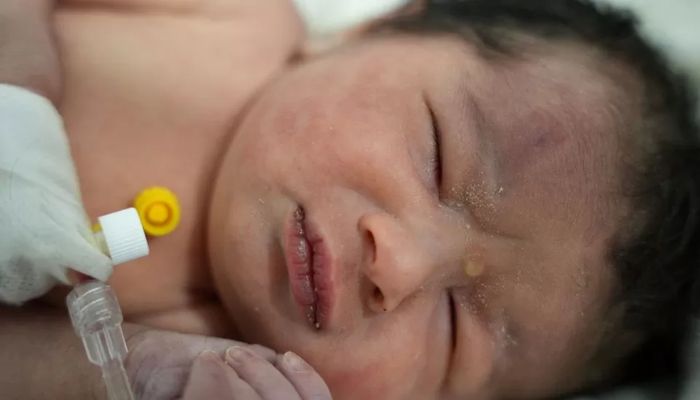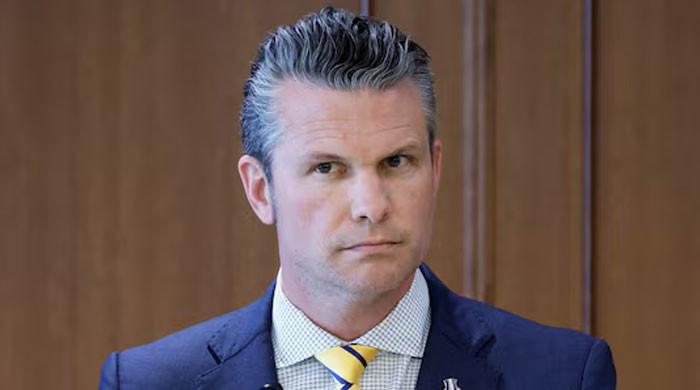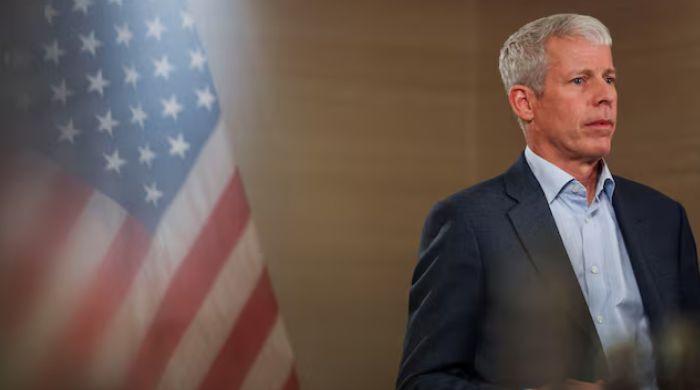Syria, Turkey earthquake: Newborn baby rescued from collapsed building
After the disaster, her mother went into labour and gave birth just before passing away
February 08, 2023

Rescue workers pulled a baby girl from the ruins of a building in northwest Syria that had been demolished by an earthquake on Monday.
After the disaster, her mother went into labour and gave birth just before passing away, according to a relative. The little girl's father, four siblings, and an aunt were also killed.
After being rescued from debris in Jindayris, the infant was seen being carried by a man in dramatic footage while she was covered in dust.
She is currently in stable condition, according to a doctor at a hospital in neighbouring Afrin.
In Jindayris, an opposition-held town in the Idlib region near to the Turkish border, a 7.8-magnitude earthquake is said to have demolished about 50 buildings, including the one in which her family resided, reported the BBC.
Khalil al-Suwadi, the infant's uncle, claimed that when family members learned of the fall, they hurried to the scene.
"We heard a voice while we were digging," he told AFP news agency on Tuesday. "We cleared the dust and found the baby with the umbilical cord [intact], so we cut it and my cousin took her to hospital."
The infant had "many bruises and lacerations over her body," according to paediatrician Hani Maarouf, when she arrived at his hospital in poor condition.
"She also arrived with hypothermia because of the harsh cold. We had to warm her up and administer calcium," he added.
A joint funeral for her mother Afraa, father Abdullah, and her four siblings was held as she was seen resting in an incubator with a drip attached.
The White Helmets, a group of volunteers that works in opposition-held areas, and the government in Damascus both estimate that 1,800 people were killed by the earthquake in Syria.
In Turkey, the region with the greatest death toll, nearly 10,000 people have perished.
"Time is running out. Hundreds are still trapped under the rubble. Every second could mean saving a life," they tweeted on Tuesday.
"We appeal to all humanitarian organisations and international bodies to provide material support and assistance to organisations responding to this disaster."
The UN has promised to utilise "any and all measures" at its disposal to provide aid to those in the north-west. It has also advised countries not to politicise assistance distribution while there are so many people in need.
Over 4 million people in the north-west, most of whom were women and children, were reliant on humanitarian help even before the earthquake.
Casualties
More than 8,700 people have been killed and thousands more injured, authorities and medical sources reported, as efforts continue to save those still trapped under rubble.
Syrian state media and rescuers said early Wednesday that at least 2,470 people have died in the earthquake and more than 4,600 have been injured across the country.
Turkey's disaster agency put the latest death toll at 6,234 with 37,011 injured in that country alone — bringing the confirmed tally in both Turkey and Syria to 8,704.
Initial rescue efforts were hampered by a winter blizzard that covered major roads in ice and snow and left three major airports in the area inoperable, complicating deliveries of vital aid.
Destruction
Some of the heaviest devastations occurred near the quake's epicentre between Kahramanmaras and Gaziantep, where entire city blocks lay in ruins.
Turkey said almost 3,000 buildings had collapsed in seven different provinces, including public hospitals.
A famous mosque dating back to the 13th century partially collapsed in the province of Maltaya, where a 14-story building with 28 apartments that housed 92 people collapsed.
Social media posts showed a 2,200-year-old hilltop castle built by Roman armies in Gaziantep lying in ruins, its walls partially turned to rubble.
In Syria, the health ministry reported damage across the provinces of Aleppo, Latakia, Hama and Tartus, where Russia is leasing a naval facility.
The UN's cultural body UNESCO warned that two sites on its World Heritage List, the old city of Syria's Aleppo and the fortress in the southeastern Turkish city of Diyarbakir, had sustained damage and that several others may also have been hit.
It noted that the quake occurred in one of the longest continuously inhabited areas on the planet within the so-called Fertile Crescent, which has witnessed the emergence of different civilisations from the Hittites to the Ottomans.
Even before the tragedy, buildings in Aleppo often toppled due to poor infrastructure and many are dilapidated after more than a decade of war.












